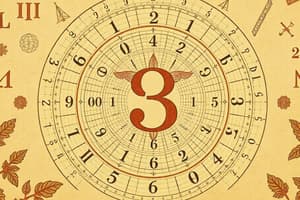Podcast
Questions and Answers
Which property of addition states that changing the order of the addends does not change the sum?
Which property of addition states that changing the order of the addends does not change the sum?
- Commutative property (correct)
- Associative property
- Distributive property
- Identity property
What is the primary focus of geometry within mathematics?
What is the primary focus of geometry within mathematics?
- Study of rates of change
- Statistical analysis of data sets
- Properties of shapes and their spatial relationships (correct)
- Manipulation of algebraic expressions
Which branch of mathematics is primarily concerned with modeling real-world scenarios and solving for unknowns?
Which branch of mathematics is primarily concerned with modeling real-world scenarios and solving for unknowns?
- Calculus
- Statistics
- Algebra (correct)
- Arithmetic
What do derivatives in calculus primarily represent?
What do derivatives in calculus primarily represent?
In statistics, which measure would be best to use to summarize the average performance of a class if the scores are heavily skewed?
In statistics, which measure would be best to use to summarize the average performance of a class if the scores are heavily skewed?
Which area of discrete mathematics is concerned with the study of integers and their properties?
Which area of discrete mathematics is concerned with the study of integers and their properties?
Which of the following best describes a primary application area of discrete mathematics?
Which of the following best describes a primary application area of discrete mathematics?
Which topic within discrete mathematics involves the study of relationships between vertices and edges?
Which topic within discrete mathematics involves the study of relationships between vertices and edges?
What mathematical area complements discrete mathematics in exploring connections between angles and sides in triangles?
What mathematical area complements discrete mathematics in exploring connections between angles and sides in triangles?
Which of the following topics is NOT typically included under discrete mathematics?
Which of the following topics is NOT typically included under discrete mathematics?
Flashcards
What is Algebra?
What is Algebra?
A branch of mathematics that uses symbols to represent quantities and relationships, often including variables. It expands on arithmetic to solve more complex equations and relationships.
What is Arithmetic?
What is Arithmetic?
The study of basic operations involving numbers, including addition, subtraction, multiplication, and division.
What is Geometry?
What is Geometry?
Deals with shapes, their properties, and spatial relationships in two and three dimensions. It explores concepts such as area, volume, and transformations.
What is Statistics?
What is Statistics?
Signup and view all the flashcards
What is Mathematics?
What is Mathematics?
Signup and view all the flashcards
Discrete Mathematics
Discrete Mathematics
Signup and view all the flashcards
Number Theory
Number Theory
Signup and view all the flashcards
Trigonometry
Trigonometry
Signup and view all the flashcards
Linear Algebra
Linear Algebra
Signup and view all the flashcards
Probability and Statistics
Probability and Statistics
Signup and view all the flashcards
Study Notes
Fundamental Concepts
- Mathematics is a broad field encompassing various branches, each with its own set of principles and applications.
- It deals with abstract concepts like numbers, shapes, and patterns, and uses logical reasoning to solve problems.
- Fundamental concepts include arithmetic, algebra, geometry, calculus, and statistics, among others.
- Mathematics is used in nearly every discipline, from science and engineering to finance and economics.
Arithmetic
- Arithmetic is the study of basic operations involving numbers.
- Key operations include addition, subtraction, multiplication, and division.
- Understanding place value, the order of operations (PEMDAS/BODMAS), and properties of numbers like commutativity, associativity, and distributivity are fundamental.
- Applications involve everyday calculations and problem solving.
Algebra
- Algebra is a branch of mathematics that uses symbols to represent quantities and relationships, often including variables.
- It expands on arithmetic to solve more complex equations and relationships.
- It involves solving equations, manipulating expressions, working with functions, and evaluating formulas.
- Common applications include modeling real-world scenarios and solving for unknowns.
Geometry
- Geometry deals with shapes, their properties, and spatial relationships in two and three dimensions.
- Basic shapes like points, lines, angles, triangles, and polygons are important building blocks.
- Geometry explores concepts such as area, volume, and transformations.
- Applications include designing structures, creating maps, and understanding space.
Calculus
- Calculus deals with rates of change and accumulation of quantities.
- It involves concepts like derivatives, integrals, limits, and infinite series.
- Derivatives help find instantaneous rates of change, while integrals find accumulated quantities.
- Applications range from engineering to physics, economics, and more complex models.
Statistics
- Statistics focuses on collecting, organizing, interpreting, and presenting data through mathematical methods.
- It involves calculating measures of central tendency (mean, median, mode), dispersion (standard deviation, variance), and probabilities.
- Interpreting graphs, probability models, and hypothesis testing are also significant topics.
- Applications include analyzing data trends, making predictions, and supporting business decisions.
Discrete Mathematics
- Discrete mathematics deals with discrete quantities, such as integers, graphs, and logic.
- It combines concepts from algebra, logic, and combinatorics providing tools for problem solving.
- Topics include set theory, counting techniques, graph theory, and propositional logic.
- Discrete mathematics has several applications, including computer science, artificial intelligence, and operations research.
Other Important Areas
- Number theory explores the properties of numbers, especially integers.
- Trigonometry deals with the relationships between the angles and sides of triangles.
- Linear algebra concerns vector spaces and linear transformations.
- Probability and Statistics provide models for randomness and uncertainty in mathematical experiments.
- Mathematical Logic establishes fundamental rules and reasoning processes.
Studying That Suits You
Use AI to generate personalized quizzes and flashcards to suit your learning preferences.




